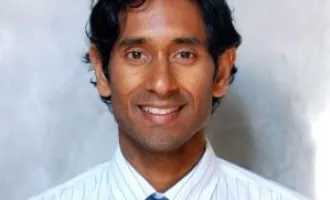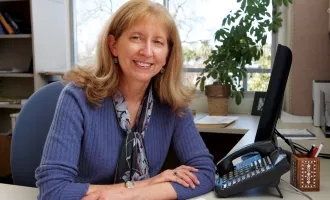This Date in UCSF History: New Students Talk Politics
Originally published in Synapse - The UCSF Student Newspaper on Sept. 28, 1978
After listening to their professors and administrators call them “the cream of the crop” for several hours, what could this year's entering medical students do? They gave themselves three lusty cheers.
“First and ten, do it again!” yelled someone from the back of the lecture hall. At last week's nursing and pharmacy school orientations the scene was similar: kudos to the winners in the biggest college bowl of all — the battle for professional health care education.
Sitting in on these orientations one gets the idea that the nation's upcoming medical elite are some sort of homogenized white sauce; yet the students entering all four professional schools here have widely divergent professional goals and political views.
The “cream” separates, in fact, over the basic issue of whether or not politics is relevant to their studies and future careers. If any of this year's classes follow the example of the medical students of the last two years, this question could turn separation into polarization, souring relations between large groups of students.
Drinking coffee at the pharmacy school orientation three well-dressed young women students agreed that politics is not what's on their minds.
“I'm interested in what I'm doing and in getting a job,” shrugged Carol Webb, 22, “I don't think politics are a big part of my life.”
“When I first started college I had a lot of wild (political) ideas, said a 23 year old dentistry student who asked to remain anonymous, “But then I went to work.
“When you work you realize that's where people spend most of their lives. With dentistry, you're pretty much assured of a good job. Dentistry seemed like a worthwhile way to speed time,” he continued, “it's not questionable like some others occupations.”
The four dental students interviewed agreed that the cost of dental care is currently the biggest controversy affecting their profession. But the new students were wary of government controls.
“If medicine were socialized I'm sure the quality would go down,” said entering student Arnold Valdez, 24, a former business student.
“As the money goes down, quality goes down. Good people will go into something more lucrative. That's a fact. A business fact.”
Jerry Sanchez, 24, who said he planned on being a dentist since he had his front teeth knocked out as a kid, said he “can't fathom” the kind of money dentists make.
Sanchez, who “comes from a simple family where putting dinner on the table was sometimes a struggle,” favors self-imposed controls. “It's all a matter of how far you want to go with making money,” he says, “I'd be more content to work less and have less pressure on me.”
“The students aren't as radical as they used to be, they're more willing to let things ride,” said dentistry student body president Ralph Hawkins.
But, said Hawkins, “a lot more students are interested in practicing in shortage areas or in their ethnic communities.”
Last year the dental school sent 60 to 80 students to work in its Tijuana clinic, said Hawkins, while four years ago only about 20 students went. Two of the five entering pharmacy students interviewed said they wanted to work with the underprivileged.
Joseph Imaga, 32, formerly a captain in the Biafran army, said he came to the United States to study pharmacy because “that's what my people need.”
Imaga plans to return to his village with his doctor brother and perhaps open a clinic — if his former enemy, the Nigerian government, lets him.
Though some pharmacy and dentistry students said they intend to work with the “underprivileged,” few students commented on the political and economic forces affecting health care in general and their professions specifically.
Pharmacy student Richard Hays, 28, a former diving officer with U.S. coast guard ice breakers, was an exception. Ironically, Hays entered pharmacy school after reading “Pills, Profits and Politics,” a controversial book by UCSF professors Milton Silverman and Philip Lee.
Hays was disturbed by one of last week's orientation that didn't appear to bother his fellow students.
“Did you notice that the pads, pens and pencils were from the drug companies?” Hays asked, “They're starting in already, on the first day.”
The medical students' orientation was slanted in the opposite direction by second year students. Claire Heriza delivered a scathing speech denouncing the “socialization” of idealistic students into conservative doctors, and the competitive ethnic which fosters such a metamorphosis.
An emotional documentary film “Health Care: Your Money or Your Life” was shown' and announcements were made for minority student caucuses and the students against Briggs committee.
The ten medical students interviewed seemed more politically oriented than the dental or pharmacy students.
In addition to their interest in “serving the poor” and “womens' health” they indicated a desire to “humanize” and “de-mystify” medicine, and investigate alternative health care techniques.
There was some indication, however, that these randomly chosen students were not totally representative of their class.
“I think there was a lot of tension in the room when Claire spoke,” said first-year student Joe Andresen. “What she was saying was very real, but it was ugly and hard to face. It would have been much easier to turn away, relax and be proud that we are young professionals.”
Andresen said he, however, had “developed a deep social commitment” as a white, middle-class high school student with third world and disadvantaged friends.
“What happened to the Bakke case really turned my stomach,” said Andresen.
“So many people see a medical education as something for themselves, when it's really a limited natural resource for us all. That should be the real issue in selecting medical students: which ones are willing to serve where they are needed.”
Like Andresen, entering student Barbara Orook, 26, has political priorities. She has worked in a women's health clinic in Boston and intends to continue women's health work after graduation.
“Not only do people have a right to health care,” said Orrok, “They have a right to access to information, to learn about their condition and the medical procedures applied to them.”
A student in the “blue” class which has been in session for six weeks, Orrok was worried she might be alone in her views.
“I was surprised that there weren't any people in the class that stood up and identified themselves as feminists, or that hissed when something politically stupid was said,” she complained.
“In the second week of class a drug company detail man came in to talk to us and pass out information and no one said anything.”
“I don't want to put people down,” she said, “This is one of the most brilliant groups of people I have ever met. But they seem cautious. They seem to be careful to appreciate what's being done for them.”
Orrok also said that some of the students in her class who might have been politically outspoken were cautioned by second year students. Last year's class polerized over the issue of whether the class's representatives to the school admissions committee would be elected from the class at large, or chosen to irisdre minority students at least equal representation.
“It was a real break between those that thought politics was part of their education and those that didn't,” said Orrok. “I personally think that politics are very important. But I suspect that what my class is trying to do is avoid the confrontation, so we can just hang out together.”
If a similar division exists among nursing students, it was not apparent in conversations with entering students.
The seven students interviewed were older, more experienced, and more critical of the medical status quo than any of the other new “young professionals.”
All seven students seem to have gone into nursing school with a very clear idea of their future course. They all intend to practice “community centered” “preventative” health care, in economically deprived or underserved areas.
But what really set the nurses apart from the students entering the other three schools was their criticism of the health care hierarchy and the types of care it creates.
Sally Foster, a 25-year-old Stanford biology graduate, said she spent the last four years, while she assisted a home birth doctor, thinking about going to medical school.
“I decided against it,” said Foster. “I don't want to learn to look at health care as strictly pathological. Nursing gives you a more holistic approach. I didn't want to be merely a technician who runs in and out fighting some disease. I wanted to treat the patient as a total human being.”
Foster was not the only nursing student who advocated a more “holistic” style of health care to be implemented by a less subordinate style of nurse.
“To be a nursing student, especially at U.C, you have to be a radical,” explained second year student Joanne Metroplos, “because the school is looking for people to transform the profession.”
Medical or dental students, on the other hand, who advocate reforms to health care techniques or delivery are often perceived as a threat to their professions.
Consequently, Heriza pointed out, medical schools tend to teach students a curriculum of conservative attitudes as well as a progression of logical skills.
“I do feel socialization is a danger,” said entering medical student John Doemeny. “I think it was a problem I had just applying to medical school. I found myself trying to present the right face, trying to fit into their idea of a medical student, all the time telling myself that later, once I was in, I could be myself, be as idealistic as I am.”
“First and ten, do it again!” Medical students huddle.


